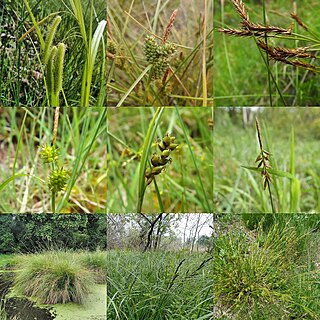
Carex is a vast genus of over 2,000 species of grass-like plants in the family Cyperaceae, commonly known as sedges. Other members of the family Cyperaceae are also called sedges, however those of genus Carex may be called true sedges, and it is the most species-rich genus in the family. The study of Carex is known as caricology.
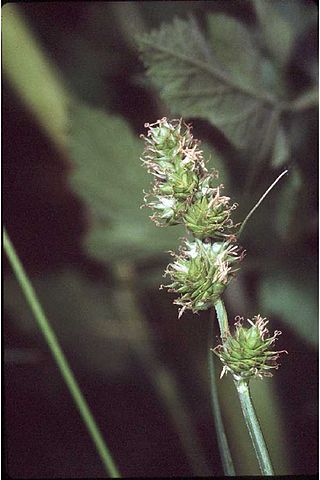
Carex molesta is a species of sedge known by the common name troublesome sedge. It is native to eastern and central North America, where it grows in varied wet and dry habitats, performs equally well in full sun and partial shade, including disturbed areas such as roadsides. It is an introduced species and often a weed in California.

Carex nebrascensis is a species of sedge commonly known as Nebraska sedge.

Carex obnupta is a species of sedge known by the common name slough sedge.

Carex pensylvanica is a species of flowering plant in the sedge family commonly called Pennsylvania sedge. Other common names include early sedge, common oak sedge, and yellow sedge.
Carex klamathensis is a rare species of sedge known by the common name Klamath sedge. It is known from 15 or fewer populations in southern Oregon and three populations in the Klamath Region of northern California. It was described to science only in 2007. Its habitat includes fens and other wet habitat, on serpentine soils. It was discovered independently by botanists Peter Zika and Lawrence Janeway.

Carex distans, commonly known as distant sedge, is a plant species in the sedge family, Cyperaceae. It is native to Europe and North Africa. It is part of a complex of similar species that occur across Eurasia. Its relatives include Carex diluta of central Asia, which has also been introduced to North America in Montana. Carex distans has been introduced to US states including Maryland and Pennsylvania. More recently, it was found in Oregon. There is a report from Victoria, Australia as well.

Carex lacustris, known as lake sedge, is a tufted grass-like perennial of the sedge family (Cyperaceae), native to southern Canada and the northern United States. C. lacustris us an herbaceous surface-piercing plant that grows in water up to 50 cm (1.6 ft) deep, and grows 50–150 cm (1.6–4.9 ft) tall. It grows well in marshes and swampy woods of the boreal forest, along river and lake shores, in ditches, marshes, swamps, and other wetland habitat. It grows on muck, sedge peat, wet sand or silt, in filtered or full sunlight.

Carex eburnea, known as ivory sedge, ebony sedge, and bristleleaf or bristle-leaved sedge, is a small and slender sedge native to North America, from Alaska and Newfoundland south to central Mexico.
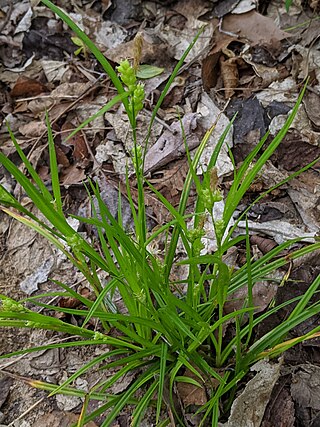
Carex blanda, the common woodland sedge or eastern woodland sedge, is a species of sedge native to a wide variety of habitats in the eastern and central United States and Canada.
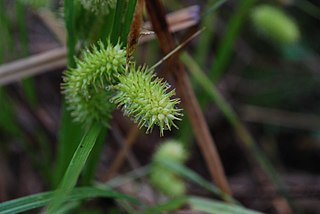
Carex lurida is a tussock-forming flowering plant of the family Cyperaceae, the sedge family. Common names for Carex lurida include shallow sedge, sallow sedge and lurid sedge.
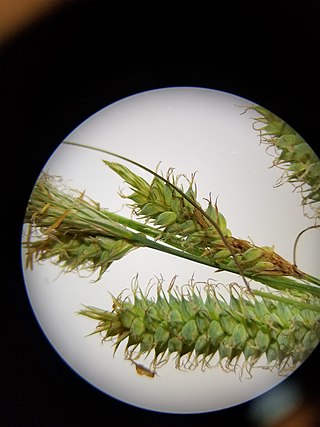
Carex glaucescens is a perennial sedge that belongs to the family Cyperaceae. The common name of this sedge is the southern waxy sedge due to the blue-grey, waxy appearance of the sheaths and fruits. The term "glaucous" means "gleaming" or "grey" in Latin; the specific epithet of C. glaucescens is derived from this term. Carex glaucescens is a native plant in North America and is an obligate wetland species in the Atlantic and Gulf Coastal Plains, Eastern Mountains and Piedmont, and the Great Plains.

Carex baileyi is a sedge in section Vesicariae the genus Carex native to the Appalachian Mountains in Eastern North America. It is commonly called Bailey's sedge. Carex baileyi was named in honor of Liberty Hyde Bailey by its discoverer, Nathaniel Lord Britton.
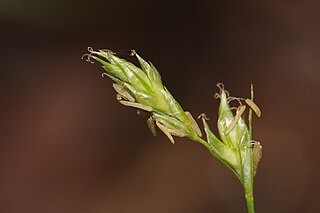
Carex deweyanaDewey's sedge, short-scale sedge, is a species of sedge native to Canada and the United States.
Carex bella is a tussock-forming species of perennial sedge in the family Cyperaceae. It is native to parts of the United States and Mexico, including California, Arizona, New Mexico, Utah, Colorado, Wyoming, and South Dakota in the United States, and Nuevo Leon in Mexico. Its common names are the Showy sedge, and the Southwestern Showy sedge.
Carex krauseorum, commonly known as Krause's sedge, is a tussock-forming species of perennial sedge in the family Cyperaceae. It is native to subarctic areas of Greenland, Alaska, northern Canada and Russia.
Carex ozarkana, the Ozark sedge, is a species of flowering plant in the family Cyperaceae, native to the U.S. states of Oklahoma, Texas, Arkansas, and Louisiana.

Carex bullata is a tussock-forming species of perennial sedge in the family Cyperaceae. It is native to south eastern parts of Canada and eastern parts of the United States. It has the common name of the button sedge.
Carex godfreyi is a tussock-forming species of perennial sedge in the family Cyperaceae. It is native to south eastern parts of the United States. Its common name is Godfrey's sedge.

Carex adelostoma is a tussock-forming species of perennial sedge in the family Cyperaceae. It is native to the subarctic areas, including Scandinavia, Russia, Canada, and Alaska. A common name is circumpolar sedge.

















